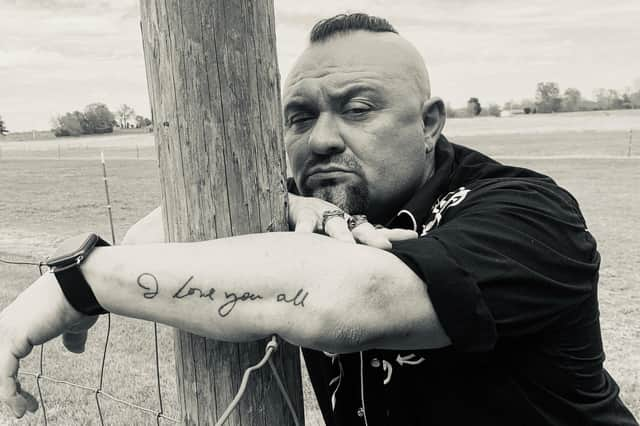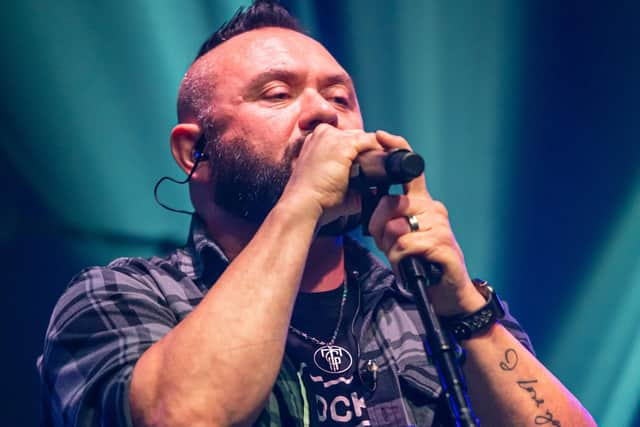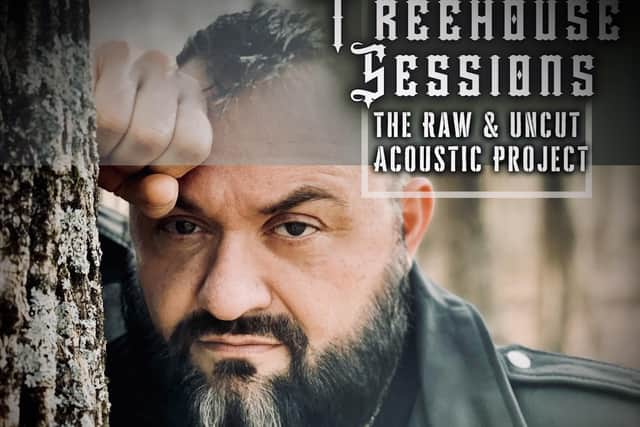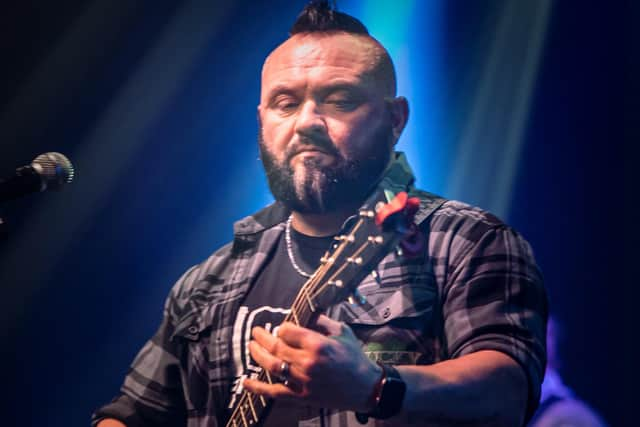Singer-songwriter Thomas Gabriel has lived out the stories his grandfather Johnny Cash sang about - and he's playing Portsmouth in October


The performance was captured on a live album released just four months later, topping the charts, revitalising the maverick country star’s career and selling more than three million copies on its way to becoming an all-time classic.
Fifty later, in 2018, singer-songwriter Thomas Gabriel was following in his grandfather’s footsteps at the infamous California prison.
Advertisement
Hide AdAdvertisement
Hide AdBut for Thomas, who had grown up around these songs, and was finally getting his own music career off the ground in his 40s, it took playing behind the prison’s walls to fully appreciate their legacy.
‘It was surreal,’ recalls Thomas. ‘When you're growing up and you've got these songs that are monumental – the whole world knows them, you've got all these songs that he made famous, for me, even as a little kid, they were just songs.
‘They never really hit home until – honestly – I went and was standing on a stage in Folsom Prison in front of Folsom prisoners, singing the song Folsom Prison Blues, and it just hit me – the magnitude of that.
‘There was even one guy in the audience that was there for his show and mine – he had been there the whole time. He was incarcerated when he was 18 years old and was still there.


Advertisement
Hide AdAdvertisement
Hide Ad‘That thing about the prison stuff – a lot of the songs my grandfather sang, they were stories to him, that ironically I ended up living out.’
Given Thomas’s family history, it is almost no surprise that he is a living distillation of numerous hard-living country music tropes – there has been trouble with drink and drugs (by his own count he has been in rehab 23 times), with the law, and with women. And hearing him sing, genetics have given him his grandfather's voice.
He released his debut Long Way Home in 2018, his new collection, The Treehouse Sessions, came out last week, and he is touring the UK for the first time this autumn.
The eldest of Cash’s grandchildren – he is the son of Kathy, one of the four daughters from Cash’s first marriage, to Vivian Liberto.


Advertisement
Hide AdAdvertisement
Hide AdKathy had Thomas at just 16, and he grew up with the singer, by now married to June Carter, often taking on a parental role.
Being the eldest grandchild, Thomas was close to his grandfather, and remembers him fondly as supportive presence.
‘What he put on stage and what he gave to his fans, was not a facade – that was him.
‘He had the courage to put himself out there and he didn't hide anything – that was part of him. Then there was the private side of him that was extremely down to earth.


Advertisement
Hide AdAdvertisement
Hide Ad‘For me he was more of a parental figure and I got into a lot of trouble, so with me, he was stern and all, but the thing about it is that he always had a lot of respect for other people.
‘Even as a young kid, he always showed me respect as a person. He was never one of those who would put you down or try to go against who you were.
‘When it came to big decisions like life and music and all that, he was always supportive as long as – and he even said this – you keep it true.
‘As long as what you do is from the heart and you're not trying to be someone else, or trying to do it for the wrong reasons, then I'm behind you.’
Advertisement
Hide AdAdvertisement
Hide AdThomas was keen to follow in the family trade as a musician.
His grandfather let Thomas use his studio, and the then 20-year-old created an EP of his own material.
While Cash believed he showed promise, he also urged the younger man to have a fallback plan.
‘His idea was to go to the police academy and to become a police officer,’ explains Thomas, ‘so I did that.
Advertisement
Hide AdAdvertisement
Hide Ad‘I was a police officer for eight years in Nashville, Tennessee, and then in an unrelated incident I was actually convicted of some felonies and ended up going to prison for the most part of 10 years.
‘That ruined the whole police thing and when I got out of jail, he said: “Get back to your music”.
‘I still wasn’t done with my time and everything though, so by the time I got done with all of my incarcerations and everything, that's what I did.’
Thomas actually wrote most of what became his deeply autobiographical debut while still behind bars. However, those songs weren’t necessarily written with any intention of being heard by an audience.
Advertisement
Hide AdAdvertisement
Hide Ad‘Most of the songs on Long Way Home, I wrote from prison. For instance, the song Cell I wrote in solitary confinement and never thought anyone would ever hear it.
‘I just figured it was a song for me, it was more of a therapeutic outlet for me while I was in there.
‘I never dreamed it would ever be released to the public.
‘Instant Release, I wrote that in about as long as it takes to hear that song. It was one of those times when I had been to rehab several times and I was getting ready to go back, I was frustrated, and before I left to go I wrote that song.
‘If you look at the album, it's kind of a timeline, it was meant to be from my first memories to the time of release of that album.
Advertisement
Hide AdAdvertisement
Hide Ad‘Putting all those songs together and releasing them was really good for me. It was an accomplishment I needed to have. I needed to take all of that life experience and put it out and share it.‘The good thing about Long Way Home is I've had a lot of feedback from people saying that they can relate and it's helped them out. That being the case, none of that was in vain.’
There were, of course, difficulties to songwriting in jail. Thomas began songwriting again while in a Tennessee prison he describes as ‘an extremely violent place, I was in a real dead-end place.’
While there he managed to get himself a job teaching fellow inmates to read, which earned him the potential for extra privileges – including a guitar.
‘Because of that, I was put in a little bit of a better place to live – this was towards the last part of my incarceration, around 2012, because I was in a lower-risk part of the compound, you could get special permission from the warden to get a guitar in.
Advertisement
Hide AdAdvertisement
Hide Ad‘So I called one of my former stepdads, we've continued to be friends, and called him up and said: “Hey, I've got a huge favour to ask you. Is there any way you could buy me a guitar and have it sent in here? When I get out, I'll pay you back or whatever I need to do”, and he did.
‘It took a while and I had to go through a lot of red tape, but I finally got the guitar and just started writing and kept writing. By the time I left prison I had just a stack of songs.’
He even managed to record an early version of the title track, Long Way Home, on a ‘little bitty tape recorder’ in a prison music class, which he then got posted out to an ex-girlfriend.
‘Honestly, I don't know what ever happened to that cassette, but that was the very first recording of the song, Long Way Home.
Advertisement
Hide AdAdvertisement
Hide Ad‘I have attempted to recover it, but I'm sure it was one of those things where you get something from a prison and you probably just stuff it in the trash – who knows?’
The new EP, Treehouse Sessions, features seven stripped-back, acoustic tracks. In the studio with just guitarist Derek Toa, they had been planning to rehearse some new material, but decided to try something different.
‘Something I had always wanted to do was to just press record and sit there and do some of my favourite songs – some of the ones I enjoy doing, we're just going to sit here, press record and play.
‘We're not going to go back, we're going to get them down and leave them. We sat there and did around 10 songs, and when we got done, I was like, that's a really refreshing way to do it.
Advertisement
Hide AdAdvertisement
Hide Ad‘That's the way they used to do it back in the ’50s and early ’60s, when they would go into say Sun Records (the famous Memphis studio and label) – some of my grandfather's first recordings were like that, and the same with Elvis or whoever was recording back then. They would go in, they had a microphone and literally recorded it live, and they kept what they had.
‘They kept not only the true raw performance, but it came from the soul, it wasn't something that you sat there and redid and redid, and did this corection and that correction, and “perfected” it, which turns out to take away some of the soul from it.
‘I chose seven out of 10 and said I'd like to see how people react to it – I'm proud of it.’
It is no surprise to hear Thomas is not a fan of studio sheen and over-producing. ‘It takes away from the whole point of being an artist, I think, because you're not putting what you genuinely have in you out there to be heard.’
Advertisement
Hide AdAdvertisement
Hide AdThomas had planned to be on the road for much 2020, which of course never happened due to the pandemic.
‘Of course I'm not the only one, everyone I know in the business, it's put a huge dent in all of our plans.
'We had another album we were working on, so it sidelined all of that.
‘It turned out to be a good thing, though, because I got a lot of writing done, and was able to start a bunch of other projects – some really obscure, some that I had wanted to do for a long time, but had never had the chance to.
Advertisement
Hide AdAdvertisement
Hide Ad‘It gave me time to reflect, it gave me time to write, it gave me time to really dive into some things that I would never have had the opportunity to do if I was touring.’
The past year also helped Thomas keep clean and sober.
‘I'll have a year in April, this time. Covid, lockdown and all, gave me the time to work on a lot of things – and that was one of them.
‘I'd run myself ragged from touring and I really needed to shape up again.
‘I've been to rehab 23 times in my lifetime, and it had got to where it was literally a process – this neverending whirlwind.
Advertisement
Hide AdAdvertisement
Hide AdI'd go to rehab, I'd get approval from people, whatever, I'd get healthy for a month or two, I'd get out and do pretty good for a little while, and then I would do it again.’
So lockdown helped break the cycle?
‘Yeah, big time. It basically saved my life.’
The Songs & Stories of Thomas Gabriel, Growing Up Cash, is at The Square Tower, Old Portsmouth, on October 3 and 4, with the first night already sold out. Tickets £16, go to squarerootspromotions.co.uk. Also check out thomasgabriel.com.
Comment Guidelines
National World encourages reader discussion on our stories. User feedback, insights and back-and-forth exchanges add a rich layer of context to reporting. Please review our Community Guidelines before commenting.